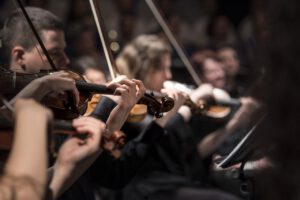
The history of Western music begins in the 4th Century as the Roman Empire was crumbling under the onslaught of barbarian invasions. It was adopted and developed within the Christian Church for use in ecclesiastical services, to elevate religious sentiment among the population and to wean the many converts to Christianity off of the pagan music and rites which were considered antithetical to Christianity.
Q2 2020 hedge fund letters, conferences and more
The History Of Western Music
While the history of Western music began in the 4th Century Church, it was based on the ancient Greek and Roman music that people have never heard and have no way of reproducing. Music was important in the Roman Empire, there were many large music festivals and it played a prominent part in the Roman military tradition. Roman music was largely derived from Greek music, but they’re too only 40 small fragments remain for scholars to study, although the music was central in the life and philosophy of Ancient Greece. The Greek philosophic basis for music greatly influenced the early development of Western music.
The various forms of chant which became an integral part of the liturgy of the Church are the foundation of Western music. Instrumental music was frowned by the Church at first though it later gained acceptance. One of the most important of the many forms of chant were the Ambrosian chants introduced in Milan circa 380 A.D. After the fall of Rome, the centre of the Christian Church moved to Byzantine Constantinople, but Milan remained important in the West, especially under Bishop Ambrose who introduced chants and helped spread them across Europe…
Music like so many other valuable assets inherited from the past is now rapidly going down the drain. Our greedy materialistic society that has relegated the mass of the population to a position of servitude under a small class of privileged masters is rapidly destroying the art of music that has been a huge, indeed indispensable, part of life since ancient times.
Classical music, indeed real music of all kinds, will soon be gone from our lives. Rather than that most sublime and complex stimulation of mind and spirit, we have opted for noise, flashing lights, and social protest from the culture that took hold in the ’80s. I hope everyone understands, I know it’s not the artists that are starting to make good money, but the distributors like Apple, Amazon and Spotify.
Real Music Lasts Forever
Real music has structure, depth, subtlety — is one of mankind’s greatest achievements requiring a lifetime of study, dedication and really hard work. It is not a fad, it lasts forever. Where do you see that in today’s so-called music? People call it “music” but it most definitely not.
People no longer visit record or CD shops to browse, sample and select individual pieces of music, they simply let Amazon, iTunes or Spotify do the work for them. The result quite predictable is increasing homogenization of music created and selected not for artistic content and music appreciation, but for economies of scale, mass commercialization, and making money of course.
The sad trend in the growing commercialization of the music world is the popularity of playlists. Intent on increasing the work productivity demanded by their employers, music consumers have become addicted to playlists that take the thinking out of music selection…
Today’s classical music is far different from that of the Middle Ages. It’s big data and new analytical techniques that are making us predictable. I only wish more AI was being applied to economic analysis where behavioural economics has much potential. Economists, unfortunately, are still trying to apply Newtonian Mechanic to their so-called science…
AI music will not be successful in competing against music performed by humans even if they use Electronic generation as a starting point and electronic means of generating sound because AI only exists in the algorithm of the coder and not in the cultural milieu in which human beings exist which is more demanding than AI can keep up with, even if their transmission of music is essentially electronic (which recording of live symphonic musicians also are).
The platform of electronic distribution is so fast that people get bored with listening to the same thing often and require new timbres, new rhythms, constant novelty, which reflects their contemporary environment and cannot be preserved in a vital manner. Also, since culture is essentially subjective the rating of culture on the basis of discreet observations, such as pitch cells, motivic development, and other complexities by scientific means misses the contemporary need for ever more demands of novelty which has a short life span. But since even the great traditions of the past can be repeated on demand in the electronic transmission, all music becomes redundant, and claims of its necessity are futile…
Anyway, The history of real music has always been met with rejection from the old guard as newer primitive styles emerged, were adopted, developed then replaced the previously dominant style. This evolution of style is now accelerating because of the speed of electronic distribution. During past style epochs you can believe that much of the so-called classical music was rubbish, but what we know of those eras is the filtered best of those bygone times…
The post AI And Spotify: The Future Of The Music Industry appeared first on ValueWalk.
